Asking for a Friend: What Causes Adult Drooling and How Do You Stop It?
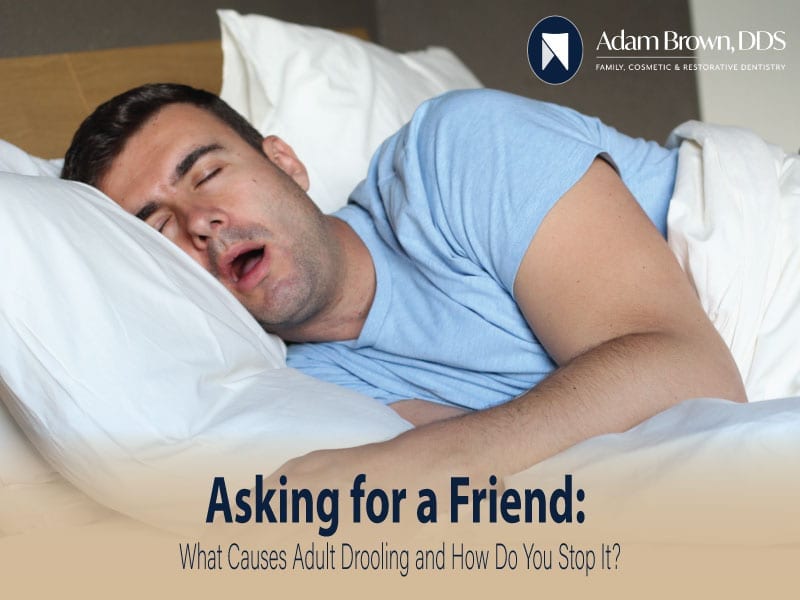
It’s a question we’ve all asked at one point or another. Sure, you never drool, but just in case you know a friend or family member who does, it’s worth knowing more about! Adam Brown DDS is here to cure your curiosity on the topic, with a few facts and some information that might be helpful for “your friend”.
When we think of drooling, we picture a cartoon swooning over another character, saliva dripping from the corner of the mouth. But for some of us, drooling is part of our reality. Many of us are familiar with waking up to drool stains on our pillow—especially if we’re side-sleepers—or wiping away the constant drool from a baby’s mouth. But when is drooling no longer normal, what even causes it, and how do you stop it from happening? Let’s sort this problem out together:
WHAT CAUSES DROOLING—THE SIMPLE ANSWER
It might be a surprise to those of us who drool, but we produce quite a bit less drool when we sleep than while we are awake. Naturally, our muscles relax as we sleep. So why do we drool? Well, the short answer is gravity. When we sleep on our back, the saliva rests in the back of the throat and drains. When we sleep on our sides or stomach, accumulated drool can slip through our lips.
But drooling doesn’t always occur because we sleep. There are many possible reasons why an adult could be drooling. If you asked your dentist about it, they might ask you questions like:
- Are there any known medical issues?
- Do you have any issues with allergies?
- Are you known to be a mouth breather?
Depending on how and when it’s occurring, or even down to the individual, drooling can have several different causes. Let’s discuss some of the most common scenarios below:
Nightguard Drooling
Wearing a dental nightguard is not the most comfortable bedtime routine, and when they’re new to us, it feels unnatural and uncomfortable. As you adjust to nightguards, you might experience drooling. We know there’s nothing worse than wet, soggy pillows, but rest assured (no pun intended) that the drooling is temporary. It might take a few weeks for your brain to get used to the appliance in your mouth, but it will eventually adjust, and your glands will return to producing a normal amount of saliva as you sleep.
Allergies & Mouth Breathing
Blocked nasal passages due to allergies can cause you to breathe through your mouth, leading to increased drooling. This can happen when you ingest a food ingredient you’re allergic to, as your body attempts to flush the toxins out by producing more saliva. However, it’s most often caused by seasonal allergies like mold and pollen. If you’re dealing with a runny nose, sneezing, and itchy eyes, the allergies likely have something to do with your drooling.
Acidity/GERD
This digestive condition washes stomach acid back into the esophagus. This damages the lining of your esophagus and can cause difficulty swallowing, thus leading to excessive drooling for some people.
Sinus Infection
Blocked sinuses are never fun. So, if you’re experiencing nasal congestion due to an infection, or if you have regularly enflamed sinuses, you might find yourself breathing through your mouth more often and drooling.
Tonsillitis
This condition inflames the glands in the back of your throat or tonsils. As the glands swell, the passage becomes more narrow and obstructs the drainage of saliva. The saliva then builds up, and gravity does its work.
Sleep Disorders
Drooling is a known symptom in those suffering from sleep terrors or sleep conditions like sleep apnea, sleepwalking, and sleep talking. Sometimes the medications taken to counteract these conditions can also cause increased saliva production (more on medications later).
Illnesses
Common illnesses such as strep throat, infectious mononucleosis, and sinus infections can cause people to experience excess drooling. Some other health conditions that are known to cause drooling include:
Epiglottitis. Your epiglottis is a plate of tissue in the back of your throat. Epiglottitis occurs when that tissue gets infected and swells, making it difficult to swallow.
Bell’s palsy. Individuals with Bell’s palsy experience muscle weakness on one side of the face. The weakness can vary from mild to severe.
Guillain-Barrè syndrome. This syndrome is an autoimmune disorder that damages nerves in various parts of the body.
Major Health Crises
After a stroke, or as a result of cerebral palsy or multiple sclerosis (MS), drool can be a symptom of a neurological condition or other health condition.
Medical issues that are symptomatic of drooling can range in severity and include a variety of conditions. Drooling can occur from posturing issues or low muscle tone in the lips, jaw, and tongue. More severe issues may require a specialist, such as a speech pathologist. But some drooling may be a cause of more simple conditions like allergies, sleep deprivation, or sleeping on your side.
Side Effects from Medications
Several medications can cause your body to increase its saliva production. This is particularly true of medications used for treating Alzheimer’s disease, psychiatric disorders, and myasthenia gravis (MG)—a neuromuscular disease that harms skeletal muscles.
If you’re taking any such medications, be sure to discuss the issue with your healthcare provider. For example, if you’re taking a certain medication for depression, you’ll want to speak with a behavioral health specialist to go over alternative treatment options. If you’re taking medications for a neurological condition, ask your neurologist about any other solutions.
NORMAL AGES FOR DROOLING
Drooling is a normal process throughout the infancy and toddler stages. Infants have immature musical control, and saliva helps to soften food and ease swallowing. Also, increased saliva protects babies’ teeth from tooth decay. Drooling becomes more frequent around three to six months of age. Because babies’ teeth are erupting from the gums, their saliva production increases, and thus, the drooling increases. Once children are past the toddler milestone, drooling can be a sign of further social and developmental issues.
HOW TO KNOW IF YOUR DROOLING IS NORMAL
Talk to your dentist and your doctor. If drooling is decreasing your quality of sleep or creating other issues, then it might be time to seek medical help. If you’re experiencing a known major illness or health condition, talking to your medical professionals is the best way to determine if your drooling is normal. There’s no substitute for a professional’s opinion.
COMMON CONSEQUENCES OF DROOLING
Yes, drooling is annoying. But it can also have a more profound impact on your physical and mental health. Frequent drooling can cause your skin to chap, become irritated, or even break out. Also, if you have trouble swallowing and often experience saliva pooling in your throat, it can lead to aspiration pneumonia (a severe lung infection). Moreover, drooling can cause feelings of embarrassment, especially when it happens in public, and it can harm one’s self-esteem.
HOW TO STOP DROOLING: TREATMENT OPTIONS
Identifying the cause of your drooling is the first step to treating it. If your drooling stems from allergies, sinus problems, or other minor conditions, the culprit is likely open-mouth breathing. For some cases, there’s an easy fix, while more extensive cases require different treatments. Let’s take a look at some of the most practical options you have in regards to drooling less (or not all):
Changing Sleeping Positions
The good news is that there is an easy fix! We recommend aiming to sleep on your back instead of your side. This will keep the saliva draining down your throat rather than out of your mouth. It might take a little while to get used to this sleeping position, but your body and mind should be able to adjust within a few weeks. And if you find yourself having breathing issues or acid reflux when purposefully sleeping on your back, you may need to seek further treatment.
Homemade Remedies
Homemade remedies are also worth trying. Some people suggest that to decrease drooling, biting a lemon wedge, consuming citrus, or drinking more water will thin the saliva and make it less likely to pool in your mouth.
Using a Mandibular Device
Some treatment options are more rigorous. Your dentist might recommend a mandibular device to help you sleep more comfortably and drool less. This oral device is like a nightguard. Your dentist can direct you where to purchase a mandibular device, but they can also be purchased online. Wherever you choose to buy your device, make sure you consult your dentist beforehand for recommendations.
Botox Injections
Another option is to get Botox injections. While this sounds a bit aggressive, it’s a viable approach to reduce hypersalivation. By injecting Botox into the saliva glands, the glands will stop overproducing saliva. This treatment is only temporary, however, and your glands will return to their normal function after the Botox wears off.
CPAP Machine
If your drooling is a result of sleep apnea, then a Continuous Positive Airway Pressure (CPAP) machine will make sure you’re positioned safely as you sleep and that you can breathe properly. Thus, it helps you to get a better, deeper night’s sleep. It should be noted, though, that the CPAP may not entirely prevent drooling.
Surgery
In extreme cases, it may be recommended that you remove your saliva glands. This is often the recommended treatment for people who have underlying neurological issues—not for those who are merely experiencing discomfort drooling while sleeping. This type of surgery is usually very successful, but it shouldn’t be the first thing you try in an attempt to stop your drooling.
Medications
Depending on the severity of your drooling, a doctor might recommend medication. This is especially the case if you have a neurological condition. For example, scopolamine (also “hyoscine”) is a medication often used to prevent drooling, as it effectively cuts off nerve impulses to the salivary glands. If you’re prescribed this medication, chances are it will come in patch form; you’ll simply place the patch behind your ear and replace it every 72 hours. It’s worth noting that scopolamine comes with potential side effects, such as rapid heart rate, itchy eyes, dry mouth, fatigue, and dizziness.
Another medication that can decrease drooling is glycopyrrolate. While it works similarly to scopolamine, it can yield more severe side effects including hyperactivity, irritability, skin flushing, decreased sweating, and difficulty urinating.
Speech Therapy
Finally, speech therapy can go a long way in decreasing—or even stopping—your drooling issues. That’s because the core goal of speech therapy is to increase jaw stability and make the tongue stronger and more mobile. Over time, speech therapy can teach you simple techniques that can help you swallow more easily and drool less.
In Conclusion
At the end of the day, drooling is not particularly unusual, nor should it be embarrassing. Most of the time, it can be curbed by making minor changes in habit or through simple treatment options. If you’re concerned about drooling or whether or not your saliva production is normal, Adam Brown DDS is here to assess your oral health. Your dentist will discuss with you if drooling is a sign of a more serious health diagnosis and get you on the right track for treatment. Give us a call today to schedule an appointment!

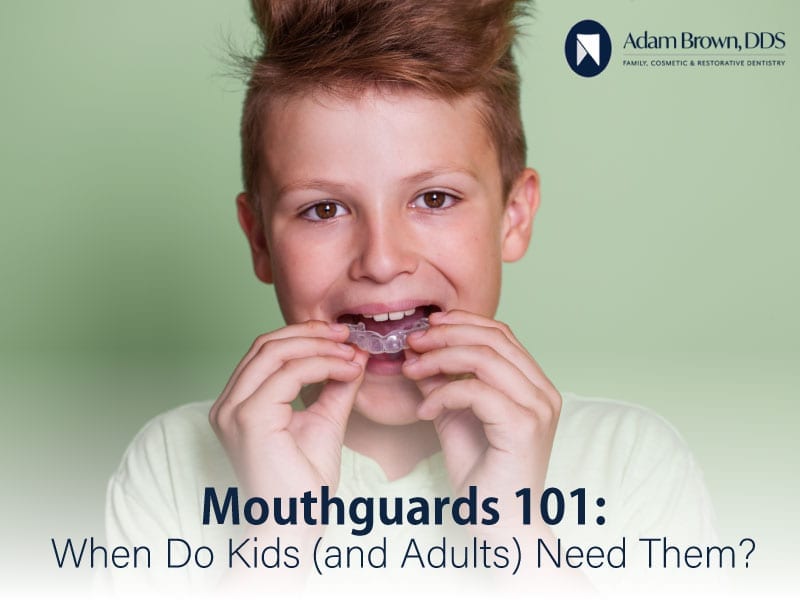
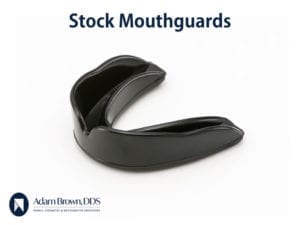
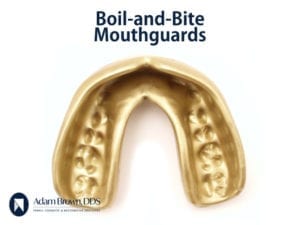
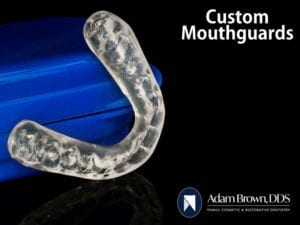 of your teeth and fabricate a mouthguard to the exact specifications of your teeth and mouth structures. Kids who play sports regularly can greatly benefit from custom mouthguards, as can adults who deal with snoring or sleep apnea.
of your teeth and fabricate a mouthguard to the exact specifications of your teeth and mouth structures. Kids who play sports regularly can greatly benefit from custom mouthguards, as can adults who deal with snoring or sleep apnea.